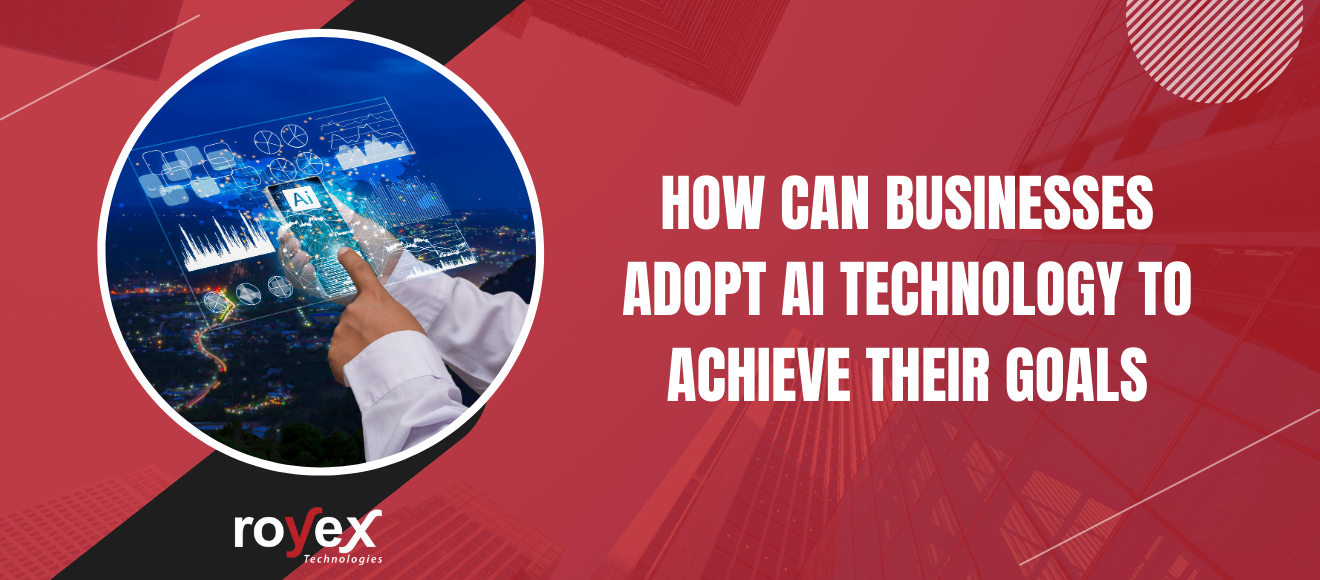
How Can Businesses Adopt AI Technology to Achieve Their Goals
Artificial Intelligence (AI) has rapidly become an integral part of modern business strategies, driving innovation and efficiency across various sectors. By leveraging AI, businesses can enhance their operations, improve customer experiences, and achieve their goals more effectively. This article explores how different types of businesses can adopt AI technology to meet their specific objectives.
Retail Businesses

Goal: Enhance Customer Experience and Optimize Inventory Management
Retail businesses aim to provide exceptional customer experiences while efficiently managing their inventory. AI can help achieve these goals in several ways:
-
Personalized Shopping Experience: AI-powered recommendation engines analyze customer data to suggest products tailored to individual preferences. This personalization increases customer satisfaction and boosts sales.
-
Chatbots and Virtual Assistants: AI-driven chatbots provide instant customer support, answer queries, and assist with product selection, enhancing the overall shopping experience.
-
Inventory Management: AI algorithms predict demand trends, helping retailers maintain optimal inventory levels, reduce stockouts, and minimize overstock situations.
Healthcare Providers
Goal: Improve Patient Care and Operational Efficiency
Healthcare providers strive to deliver high-quality patient care while maintaining operational efficiency. AI technologies can play a crucial role in achieving these goals:
-
Predictive Analytics: AI analyzes patient data to predict disease outbreaks, identify high-risk patients, and recommend preventive measures, improving patient outcomes.
-
Diagnostic Tools: AI-powered diagnostic tools assist doctors in accurately diagnosing diseases from medical images and other data, leading to timely and effective treatments.
-
Administrative Automation: AI automates routine administrative tasks such as scheduling, billing, and patient record management, allowing healthcare professionals to focus more on patient care.
Financial Services
Goal: Enhance Risk Management and Customer Service
Financial institutions aim to manage risks effectively and provide superior customer service. AI technologies can significantly contribute to these objectives:
-
Fraud Detection: AI systems analyze transaction patterns in real-time to detect and prevent fraudulent activities, safeguarding both the institution and its customers.
-
Customer Insights: AI-driven analytics provide deep insights into customer behavior, enabling personalized financial advice and product recommendations.
-
Robotic Process Automation (RPA): AI-powered RPA automates repetitive tasks such as data entry and compliance checks, reducing operational costs and improving accuracy.
Manufacturing

Goal: Increase Production Efficiency and Reduce Downtime
Manufacturing companies seek to maximize production efficiency and minimize downtime. AI technologies can help achieve these goals through:
-
Predictive Maintenance: AI monitors equipment performance and predicts potential failures before they occur, allowing for timely maintenance and reducing unplanned downtime.
-
Quality Control: AI-powered vision systems inspect products for defects with high accuracy, ensuring consistent product quality and reducing waste.
-
Supply Chain Optimization: AI optimizes supply chain processes by forecasting demand, managing inventory, and streamlining logistics, leading to cost savings and improved delivery times.
Marketing and Advertising
Goal: Improve Campaign Effectiveness and Audience Targeting
Marketing and advertising agencies aim to create impactful campaigns and reach the right audience. AI technologies can enhance these efforts:
-
Audience Segmentation: AI analyzes consumer data to identify distinct audience segments, allowing marketers to tailor campaigns for specific groups and increase engagement.
-
Content Generation: AI tools generate personalized content for advertisements, emails, and social media posts, ensuring relevant messaging for each audience segment.
-
Performance Analytics: AI-driven analytics track campaign performance in real-time, providing insights that enable marketers to adjust strategies and maximize ROI.
Logistics and Transportation
Goal: Optimize Routes and Improve Delivery Efficiency
Logistics and transportation companies focus on optimizing routes and improving delivery efficiency. AI technologies can play a vital role in achieving these goals:
-
Route Optimization: AI algorithms calculate the most efficient routes for deliveries, considering factors such as traffic, weather, and road conditions, reducing fuel consumption and delivery times.
-
Fleet Management: AI systems monitor vehicle performance and driver behavior, ensuring timely maintenance and promoting safe driving practices.
-
Demand Forecasting: AI predicts demand patterns, allowing companies to allocate resources effectively and improve service levels.
Real World Examples of Companies That Failed Because They Didn't Use AI
While the benefits of AI adoption are clear, the absence of AI integration has had notable adverse effects on businesses across various sectors.
Blockbuster: Blockbuster's resistance to digital transformation and online streaming services contributed to its downfall. The company failed to recognize the potential of AI-driven recommendation algorithms and digital content delivery. Meanwhile, competitors like Netflix leveraged AI to provide personalized viewing experiences, leading to Blockbuster's eventual bankruptcy in 2010.
Kodak: Kodak's failure to embrace digital photography in the early stages led to its decline. Despite inventing the first digital camera, Kodak was slow to adopt digital technology, fearing it would cannibalize its film business. This reluctance allowed competitors to dominate the digital photography market, leading to a significant loss in sales and eventually bankruptcy in 2012.
Sears: Sears' reluctance to integrate AI into its retail operations and online presence contributed to its decline. Competitors like Amazon used AI to optimize logistics, personalize shopping experiences, and predict consumer behavior. Sears' failure to adopt similar technologies led to a loss in competitiveness, declining sales, and ultimately, bankruptcy in 2018.
The examples above clearly show that companies failing to adopt AI are falling behind. These businesses struggle to compete with those that use AI to improve their operations and customer experiences. Without AI, they miss out on opportunities for innovation, efficiency, and staying ahead in the market.
Conclusion
AI technology offers immense potential for businesses across various sectors to achieve their goals. By adopting AI, companies can enhance customer experiences, improve operational efficiency, and drive innovation. The key to successful AI adoption lies in understanding specific business needs and strategically implementing AI solutions that align with those objectives. As AI continues to evolve, its integration into business processes will undoubtedly become even more critical for achieving long-term success.
How Can Royex Help You in Adopting AI
Royex Technologies, is a leading artificial intelligence (AI) company in Dubai. We offer comprehensive AI solutions to help companies integrate artificial intelligence into their operations. Our services include developing tailored AI strategies, providing expert consultation, and implementing AI-powered solutions for customer support, data analytics, process automation, marketing, sales optimization, and cybersecurity. Through our AI-first customer support platform Eyaana, advanced analytics capabilities, and intelligent workflow management systems, Royex assists businesses in enhancing efficiency, making data-driven decisions, and staying competitive in today's technology-driven market. By partnering with Royex, companies can leverage cutting-edge AI technologies to achieve their goals and drive long-term success across various aspects of their business operations.
Check our portfolio to see our previous works. Contact us via email at info@royex.net or call us at +971566027916. To get started with us.





